Fleurs du Mal Magazine


Or see the index
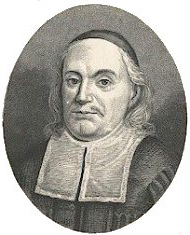
Ich hab oft
bei mir selbst gedacht
Ich hab oft bei mir selbst gedacht,
Wann ich den Lauf der Welt betracht,
Ob auch das Leben dieser Erd
Uns gut sei und des Wünschens wert,
Und ob nicht der viel besser tu,
Der sich fein zeitlich legt zur Ruh.
Denn, Lieber, denk und sage mir:
Was für ein Stand ist wohl allhier,
Dem nicht sein Angst, sein Schmerz und Weh
Alltäglich überm Haupte steh?
Ist auch ein Ort, der Kummers frei
Und ohne Klag und Sorgen sei?
Sieh unsers ganzen Lebens Lauf:
Ist auch ein Tag von Jugend auf,
Der nicht sein eigne Qual und Plag
Auf seinem Rücken mit sich trag?
Ist nicht die Freude, die uns stillt,
Auch selbst mit Jammer überfüllt?
Hat einer Glück und gute Zeit,
Hilf Gott, wie tobt und zürnt der Neid!
Hat einer Ehr und große Würd,
Ach, mit was großer Last und Bürd
Ist, der vor andern ist geehrt,
Vor andern auch dabei beschwert!
Ist einer heute gutes Muts,
Ergötzt und freut sich seines Guts:
Eh ers vermeint, fährt sein Gewinn
Zusamt dem guten Mute hin!
Wie plötzlich kommt ein Ungestüm
Und wirft die großen Güter üm!
Bist du denn fromm und fleuchst die Welt
Und liebst Gott mehr als Gold und Geld,
So wird dein Ruhm, dein Schmuck und Kron
In aller Welt zu Spott und Hohn;
Denn wer der Welt nicht heucheln kann,
Den sieht die Welt für albern an.
Nun, es ist wahr, es steht uns hier
Die Trübsal täglich vor der Tür,
Und findt ein jeder überall
Des Kreuzes Not und bittre Gall.
Sollt aber drum der Christen Licht
Ganz nichts mehr sein? Das glaub ich nicht.
Ein Christe, der an Christo klebt,
Und stets im Geist und Glauben lebt,
Dem kann kein Unglück, keine Pein
Im ganzen Leben schädlich sein;
Gehts ihm nicht allzeit wie es soll,
So ist ihm dennoch allzeit wohl.
Hat er nicht Gold, so hat er Gott,
Fragt nicht nach böser Leute Spott,
Verwirft mit Freuden und verlacht
Der Welt verkehrten Stolz und Pracht.
Sein Ehr ist Hoffnung und Geduld,
Sein Hoheit ist des Höchsten Huld.
Es weiß ein Christ und bleibt dabei,
Daß Gott sein Freund und Vater sei;
Er hau, er brenn, er stech, er schneid,
Hier ist nichts, das uns von ihm scheid,
Je mehr er schlägt, je mehr er liebt,
Bleibt fromm, ob er uns gleich betrübt.
Laß alles fallen, wie es fällt:
Wer Christi Lieb im Herzen hält,
Der ist ein Held und bleibt bestehn,
Wann Erd und Himmel untergehn;
Und wann ihn alle Welt verläßt,
Hält Gottes Wort ihn steif und fest.
Des Höchsten Wort dämpft alles Leid
Und kehrts in lauter Lust und Freud;
Es nimmt dem Unglück alles Gift,
Daß, obs uns gleich verfolgt und trifft,
Es dennoch unser Herze nie
In allzu große Trauer zieh.
Ei nun, so mäßge deine Klag!
Ist dieses Leben voller Plag,
Ists dennoch an der Christen Teil
Auch voller Gottes Schutz und Heil.
Wer Gott vertraut und Christum ehrt,
Der bleibt im Kreuz auch unversehrt.
Gleichwie das Gold durchs Feuer geht
Und in dem Ofen wohl besteht,
So bleibt ein Christ durch Gottes Gnad
Im Elendsofen ohne Schad;
Ein Kind bleibt seines Vaters Kind,
Obs gleich des Vaters Zucht empfindt.
Drum, liebes Herz, sei ohne Scheu
Und sieh auf deines Vaters Treu!
Empfindst du auch hier seine Rut,
Er meints nicht bös, es ist dir gut!
Gib dich getrost in seine Händ,
Es nimmt zuletzt ein gutes End.
Leb immerhin, so lang er will!
Ists Leben schwer, so sei du still,
Es geht zuletzt in Freuden aus:
Im Himmel ist ein schönes Haus,
Da, wer nach Christo hier gestrebt,
Mit Christi Engeln ewig lebt!
Paul Gerhardt
(1607 – 1676)
Ich hab oft bei mir selbst gedacht
• fleursdumal.nl magazine
More in: # Classic Poetry Archive, Archive G-H, Archive G-H
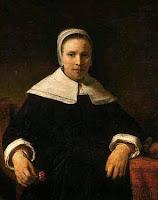
Winter
Cold, moist, young phlegmy winter now doth lie
In swaddling clouts, like new-born infancy;
Bound up with frosts, and fur’d with hail & snows,
And, like an infant, still it taller grows.
December is my first, and now the sun
To the southward Tropick his swift race doth run.
This month he’s hous’d in horned Capricorn,
From thence he ’gins to length the shortened morn,
Through Christendom with great festivity,
Now’s held (but guessed) for blest Nativity.
Cold, frozen January next comes in,
Chilling the blood, and shrinking up the skin.
In Aquarius now keeps the long-wish’d sun,
And northward his unwearied course doth run.
The day much longer than it was before,
The cold not lessened, but augmented more.
Now toes and ears, and fingers often freeze,
And travelers their noses sometimes leese.
Moist snowy February is my last,
I care not how the winter-time doth haste.
In Pisces now the golden sun doth shine,
And northward still approaches to the line.
The rivers ’gin to ope, the snows to melt,
And some warm glances from his face are felt;
Which is increased by the lengthen’d day,
Until by’s heat, he drive all cold away.
And thus the year in circle runneth round;
Where first it did begin, in th’ end its found.
Anne Bradstreet
(1612 – 1672)
Winter
• fleursdumal.nl magazine
More in: # Classic Poetry Archive, 4SEASONS#Winter, Archive A-B, Archive A-B, Bradstreet, Anne
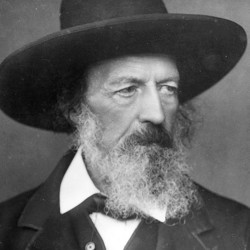
Milton
(Alcaics)
O mighty-mouth’d inventor of harmonies,
O skill’d to sing of Time or Eternity,
God-gifted organ-voice of England,
Milton, a name to resound for ages;
Whose Titan angels, Gabriel, Abdiel,
Starr’d from Jehovah’s gorgeous armouries,
Tower, as the deep-domed empyrean
Rings to the roar of an angel onset—
Me rather all that bowery loneliness,
The brooks of Eden mazily murmuring,
And bloom profuse and cedar arches
Charm, as a wanderer out in ocean,
Where some refulgent sunset of India
Streams o’er a rich ambrosial ocean isle,
And crimson-hued the stately palm-woods
Whisper in odorous heights of even.
Alfred Lord Tennyson
(1809-1892)
Milton
• fleursdumal.nl magazine
More in: Archive S-T, Archive S-T, Milton, John, Tennyson, Alfred Lord

Den Geist?
Den Geist?
Als ob es Weiber gäbe,
die ihn liebten.
Schöne Gestalt gefällt ihnen
und Reichtum.
Ulrich von Hutten
Ritter und Dichter
(* 21.04.1488, † 29.08.1523)
Den Geist?
• fleursdumal.nl magazine
More in: #Editors Choice Archiv, - Archive Tombeau de la jeunesse, Archive G-H, Archive G-H, Hutten, Ulrich von
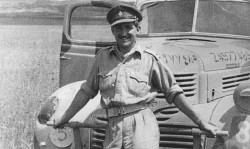
Oxford
At home as in no other city, here
summer holds her breath in a dark street
the trees nocturnally scented, lovers like moths
go by silently on the footpaths
and spirits of the young wait,
cannot be expelled, multiply each year.
In the meadows, walks, over the walls
the sunlight, far-travelled, tired and content,
warms the recollections of old men, touching
the hand of the scholar on his book, marching
through quadrangles and arches, at last spent
it leans through the stained windows and falls.
This then is the city of young men, of beginning,
ideas, trials, pardonable follies,
the lightness, seriousness and sorrow of youth.
And the city of the old, looking for truth,
browsing for years, the mind’s seven bellies
filled, become legendary figures, seeming
stones of the city, her venerable towers;
dignified, clothed by erudition and time.
For them it is not a city but an existence;
outside which everything is a pretence:
within, the leisurely immortals dream,
venerated and spared by the ominous hours.
Keith Douglas
(1920 – 1944)
Oxford
• fleursdumal.nl magazine
More in: # Classic Poetry Archive, Archive C-D, Archive C-D, Douglas, Keith, WAR & PEACE
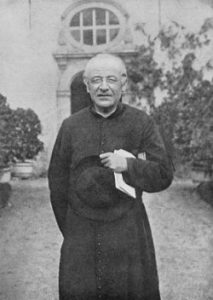
Het Schrijverken
(Gyrinus Natans)
O Krinklende winklende waterding
met ‘t zwarte kabotseken aan,
wat zien ik toch geren uw kopke flink
al schrijven op ‘t waterke gaan!
Gij leeft en gij roert en gij loopt zo snel,
al zie ‘k u noch arrem noch been;
gij wendt en gij weet uwen weg zo wel,
al zie ‘k u geen ooge, geen één.
Wat waart, of wat zijt, of wat zult gij zijn?
Verklaar het en zeg het mij, toe!
Wat zijt gij toch, blinkende knopke fijn,
dat nimmer van schrijven zijt moe?
Gij loopt over ‘t spegelend water klaar,
en ‘t water niet meer en verroert
dan of het een gladdige windtje waar,
dat stille over ‘t waterke voert.
o Schrijverkes, schrijverkes, zegt mij dan, –
met twintigen zijt gij en meer,
en is er geen een die ‘t mij zeggen kan: –
Wat schrijft en wat schrijft gij zo zeer?
Gij schrijft, en ‘t en staat in het water niet,
gij schrijft, en ‘t is uit en ‘t is weg;
geen christen en weet er wat dat bediedt:
och, schrijverke, zeg het mij, zeg!
Zijn ‘t visselkes daar ge van schrijven moet?
Zijn ‘t kruidekes daar ge van schrijft?
Zijn ‘t keikes of bladtjes of blomkes zoet,
of ‘t water, waarop dat ge drijft?
Zijn ‘t vogelkes, kwietlende klachtgepiep,
of is ‘et het blauwe gewelf,
dat onder en boven u blinkt, zoo diep,
of is het u, schrijverken zelf?
En t krinklende winklende waterding,
met ‘t zwarte kapoteken aan,
het stelde en het rechtte zijne oorkes flink,
en ‘t bleef daar een stondeke staan:
“Wij schrijven,” zoo sprak het, “al krinklen af
het gene onze Meester, weleer,
ons makend en leerend, te schrijven gaf,
één lesse, niet min nochte meer;
wij schrijven, en kunt gij die lesse toch
niet lezen, en zijt gij zo bot?
Wij schrijven, herschrijven en schrijven nog,
den heiligen Name van God!”
Guido Gezelle
(1830 – 1899)
Het Schrijverken
Uit: Vlaemsche dichtoefeningen
• fleursdumal.nl magazine
More in: Archive G-H, Archive G-H, Gezelle, Guido, Guido Gezelle

An Opium Fantasy
Soft hangs the opiate in the brain,
And lulling soothes the edge of pain,
Till harshest sound, far off or near,
Sings floating in its mellow sphere.
What wakes me from my heavy dream?
Or am I still asleep?
Those long and soft vibrations seem
A slumberous charm to keep.
The graceful play, a moment stopt,
Distance again unrolls,
Like silver balls, that, softly dropt,
Ring into golden bowls.
I question of the poppies red,
The fairy flaunting band,
While I, a weed with drooping head,
Within their phalanx stand:
‘’Some airy one, with scarlet cap,
The name unfold to me
Of this new minstrel who can lap
Sleep in his melody!”
Bright grew their scarlet-kerchief’d heads.
As freshening winds had blown,
And from their gently-swaying beds
They sang in undertone:
“Oh he is but a little owl,
The smallest of his kin,
Who sits beneath the midnight’s cowl
And makes this airy din.”
“Deceitful tongues of fiery tints!
Far more than this ye know,
That he is your enchanted prince
Doom’d as an owl to go;–
“Nor his fond play for years hath stopt.
But nightly he unrolls
His silver balls, that, softly dropt,
Ring into golden bowls.’
Maria White Lowell
(1821 – 1853)
An Opium Fantasy
• fleursdumal.nl magazine
More in: # Classic Poetry Archive, Archive K-L, Archive K-L, DRUGS & DISEASE & MEDICINE & LITERATURE, Maria White Lowell, Opium-Eaters

Aimer est un destin charmant
Aimer est un destin charmant ;
C’est un bonheur qui nous enivre,
Et qui produit l’enchantement.
Avoir aimé, c’est ne plus vivre,
Hélas ! c’est avoir acheté
Cette accablante vérité,
Que les serments sont un mensonge,
Que l’amour trompe tôt ou tard,
Que l’innocence n’est qu’un art,
Et que le bonheur n’est qu’un songe.
Évariste de Parny
(1753-1814)
Aimer est un destin charmant
Élégies (1784)
• fleursdumal.nl magazine
More in: # Classic Poetry Archive, Archive O-P, Archive O-P

Hochmut reitet zu Pferde
Hochmut reitet zu Pferde aus
und kehrt zu Fuß heim.
Ulrich von Hutten
Ritter und Dichter
(* 21.04.1488, † 29.08.1523)
Hochmut reitet zu Pferde
• fleursdumal.nl magazine
More in: - Archive Tombeau de la jeunesse, Archive G-H, Archive G-H, Hutten, Ulrich von
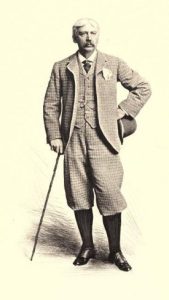
Chiquita
BEAUTIFUL! Sir, you may say so. Thar isn’t her match in the county;
Is thar, old gal,—Chiquita, my darling, my beauty?
Feel of that neck, sir,—thar ‘s velvet! Whoa! Steady,—ah, will you, you vixen!
Whoa! I say. Jack, trot her out; let the gentleman look at her paces.
Morgan!—She ain’t nothin’ else, and I ‘ve got the papers to prove it.
Sired by Chippewa Chief, and twelve hundred dollars won’t buy her.
Briggs of Tuolumne owned her. Did you know Briggs of Tuolumne?
Busted hisself in White Pine, and blew out his brains down in ‘Frisco?
Hedn’t no savey, hed Briggs. Thar, Jack! that ‘ll do, quit that foolin’!
Nothin’ to what she kin do, when she ‘s got her work cut out before her.
Hosses is hosses, you know, and likewise, too, jockeys is jockeys;
And ‘t ain’t ev’ry man as can ride as knows what a hoss has got in him.
Know the old ford on the Fork, that nearly got Flanigan’s leaders?
Nasty in daylight, you bet, and a mighty rough ford in low water!
Well, it ain’t six weeks ago that me and the Jedge and his nevey
Struck for that ford in the night, in the rain, and the water all around us;
Up to our flanks in the gulch, and Rattlesnake Creek just a bilin’,
Not a plank left in the dam, and nary a bridge on the river.
I had the gray, and the Jedge had his roan, and his nevey, Chiquita;
And after us trundled the rocks jest loosed from top of the cañon.
Lickity, lickity, switch, we came to the ford, and Chiquita
Buckled right down to her work, and, afore I could yell to her rider,
Took water jest at the ford; and there was the Jedge and me standing,
And twelve hundred dollars of hoss-flesh afloat, and a-driftin’ to thunder!
Would ye b’lieve it? That night, that hoss, that ar’ filly, Chiquita,
Walked herself into her stall, and stood there, all quiet and dripping:
Clean as a beaver or rat, with nary a buckle of harness,
Just as she swam the Fork,—that hoss, that ar’ filly, Chiquita.
That ‘s what I call a hoss! and—What did you say?—Oh! the nevey?
Drownded, I reckon,—leastways, he never kem back to deny it.
Ye see, the derned fool had no seat, ye could n’t have made him a rider;
And then, ye know, boys will be boys, and hosses—well, hosses is hosses!
1872
Bret Harte
(1836-1902)
Chiquita
• fleursdumal.nl magazine
More in: # Classic Poetry Archive, Archive G-H, Archive G-H, Bret Harte, Western Fiction

For Deliverance From A Fever
When sorrows had begirt me round,
And pains within and out,
When in my flesh no part was found,
Then didst Thou rid me out.
My burning flesh in sweat did boil,
My aching head did break,
From side to side for ease I toil,
So faint I could not speak.
Beclouded was my soul with fear
Of Thy displeasure sore,
Nor could I read my evidence
Which oft I read before.
“Hide not Thy face from me!” I cried,
“From burnings keep my soul.
Thou know’st my heart, and hast me tried;
I on Thy mercies roll.”
“O heal my soul,” Thou know’st I said,
“Though flesh consume to nought,
What though in dust it shall be laid,
To glory t’ shall be brought.”
Thou heard’st, Thy rod Thou didst remove
And spared my body frail
Thou show’st to me Thy tender love,
My heart no more might quail.
O, praises to my mighty God,
Praise to my Lord, I say,
Who hath redeemed my soul from pit,
Praises to Him for aye.
Anne Bradstreet
(1612 – 1672)
For Deliverance From A Fever
• fleursdumal.nl magazine
More in: # Classic Poetry Archive, Archive A-B, Archive A-B, Bradstreet, Anne

The Eagle
He clasps the crag with crooked hands;
Close to the sun in lonely lands,
Ring’d with the azure world, he stands.
The wrinkled sea beneath him crawls;
He watches from his mountain walls,
And like a thunderbolt he falls.
Alfred Lord Tennyson
(1809-1892)
The Eagle
• fleursdumal.nl magazine
More in: Archive S-T, Archive S-T, Department of Birds of Prey, Department of Ravens & Crows, Tennyson, Alfred Lord
Thank you for reading Fleurs du Mal - magazine for art & literature